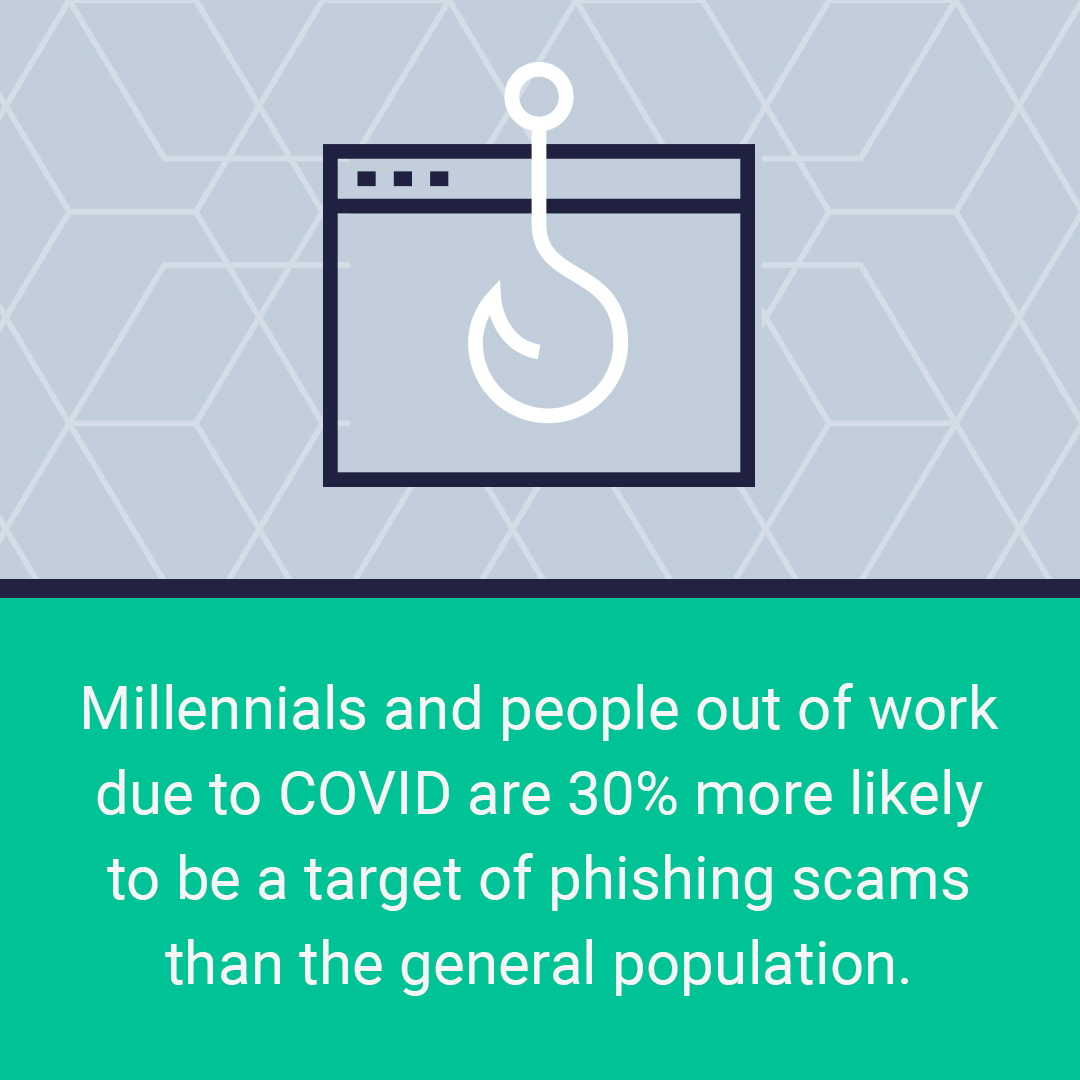Advice for Millennials…and All of Us: Don’t Fall for COVID-Related Cyber Fraud
Post Summary: A recent survey found that millennials and people out of work due to COVID are 30 percent more likely to be targeted by phishing scams than the general population. Read this post for examples of these types of scams and fraud and some tips to protect yourself online.
Scammers target millennials in new COVID fraud, but we're all at risk

The coronavirus pandemic has altered everyone’s lives. While not everyone has gotten physically sick, stay-at-home orders and social distancing have left many people out of work or with reduced income and feeling isolated, bored, and depressed. Making many people, and particularly millennials, prime targets for social media cyber fraud that promise job opportunities, financial help, or companionship. In fact, a recent survey found that millennials and people out of work due to COVID are 30 percent more likely to be targeted by phishing scams than the general population.
Millennials (and younger generations) consume vast amounts of content online, from streaming media to gaming to following popular bloggers and influencers. They’re tuned into the money-making power of the internet: the online “gig economy,” with chances to make money from home, and the potential build a big social media and earn by recommending products that your followers might like.
Scammers are taking advantage of that knowledge in multiple ways. Here are just a few examples of social media-based scams that target the at-home, lonely, and unemployed:
- A scammer built up an Instagram account with 100,000 followers, then offered to sell it to the highest bidder. A young woman paid $100 for it through the popular Cash App money transfer service—money she couldn’t afford to lose—and then found out the sale was a scam. The money had already transferred, so she was unlikely to get it back.
- A Minnesota woman received a notice on social media that she had won $100,000 in a lottery, supposedly sponsored by the social media site. But to collect the money, she was asked to send a cash card loaded with $750 to “pay taxes on her winnings.” Fortunately, she was savvy enough to recognize a scam and report it to the social media site.
- Work-from-home scams advertised through social media, a promise of easy money to the unemployed or underemployed seems ideal. Instead, they typically charge a startup fee for a kit or other work materials and, once they have a credit card number, may charge monthly “membership fees” without warning or permission. They can also send “employment paperwork” meant to steal personal information. Of course, the promised income never happens.
- Scammers imitate real online philanthropists, offering money give-aways in order to gather personal information on their victims. The money never comes. All the victims can anticipate is identity fraud.
And, as always, there are the scams targeting the lonely. Millions of social media users get friend invitations from fake social media accounts created by con artists intent on romance scams or other forms of thievery. This savvy blogger relates that an actor friend has his social media photos lifted constantly to build fake social media accounts, and he found out from investigators that at least one woman had been scammed out of many thousands of dollars through one of them.
If you’re home-bound and feeling isolated or stressed about money, first, be aware that you may be more vulnerable than usual. Try to muster a healthy heap of skepticism about unsolicited online job offers or uninvited social media friends.
Here are some more tips to help you spot the scams:
- Don’t click on unsolicited emails, texts, or pop-up ads. If they look legit, contact the organization directly through their website to verify that the offer is legit. (Fake coupons are another current phishing scam, BTW.)
- Be alert for invitations or messages from fake social media accounts. They’re often recently created, have content with lots of spelling and grammar errors, have photos that look like stock photos or models, and have friend lists that happen to all be friends of yours, too. (What are the chances?) If it’s a romance scam, the person often lists a very impressive or lucrative-sounding job, along with a sickly sweet description implying that this person is kind and lonely and looking for love.
- Beware of any “opportunity” that rushes you into providing information or sending money. Urgency is one of the emotional tricks that scammers use to keep their victims from noticing that something’s not right. If it reeks of the “Act now!” or “This opportunity won’t last!” ploy, chances are this opportunity isn’t real.
- Google the person or business name, email address, and/or URL to see if there are any scam complaints about them.
- Never send money by wire transfer, overnight delivery, or reloadable cards unless you are absolutely certain of the person or business you’re dealing with.
Sometimes it’s hard to say which is worse: the fear of COVID-19 or the uncertainty and isolation of staying home. But it is certain that getting scammed out of much-needed money or having your identity stolen will add to the stress. So, even when you’re job-hunting or socializing virtually, be smart, be safe, and be wary.
About IDX
We're your proven partner in digital privacy protection with our evolving suite of privacy and identity products.